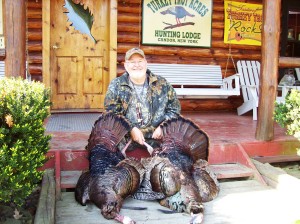If you sometimes wonder where the food served at a hotel restaurant comes from, you might want to check out one of the programs I profiled for CNBC Road Warrior where the on-site chef will cook up what guests catch, shoot or forage.
Me? I think I’m going to try the forage option.
Farm-to-table meals have become so popular that hotels are now getting in the game with an even closer-to-the-source experience by offering chef-prepared meals using food hooked, foraged or shot by their guests.
You might visit Turkey Trot Acres in Candor, New York, for a wedding reception, reunion, barbecue or zombie-fest, but wild turkey hunting in the spring and fall is what this upstate lodge is best known for.
Turkey Trot specializes in three-day guided hunting packages that start at $1,200 and include single-bed rooms, meals and guides. And while not everyone bags a turkey, those who do usually pose proudly with their bird before it goes into the cooler.
“Turkey Trot will clean the turkey for you, package it and tell you how to cook it. And if you want it prepared for dinner, they’ll do that too,” said Marlin Watkins, a well-known turkey call maker from southeast Ohio who’s been a regular at the lodge for the past 25 years.
“But when you harvest a wild turkey it’s such an event that most people would rather take it home to show off to their friends and family. I’ve seen a lot of turkeys go home in the back of a Cadillac,” Watkins said.
Next winter, Viceroy Snowmass, near Aspen, Colorado, will be adding a “you kill/we cook” option to its menu of hotel activities. From Nov. 8 to Jan. 18, guests will be able to hunt for pheasant, duck and goose—but not turkey—with guides from the Aspen Outfitting Company. The hotel’s executive chef, Will Nolan, will show guests how he breaks down the game and then prepares it for a meal. The cost: $2,200, not including accommodations.
“Guests are constantly looking for ways to get closer to their food, and I can’t think of a more intimate experience,” said Nolan. “The most memorable meals are those that you actually have a part in creating, so this fits the bill in a number of exciting ways.”
Michigan’s Catch & Cook program, a joint project of a half dozen public agencies and commercial associations, connects charter fishing clients and charter boat operators in the state’s Great Lakes region with about 50 restaurants, many of them linked to hotels and inns, which will cook and serve the day’s catch.
The program began in 2012 and has reeled in a net full of economic benefits.
“Distinctive experiences like Catch & Cook are likely to be told and retold,” said Jordan Burroughs, a wildlife outreach specialist at Michigan State University. Charter boat businesses benefit through positive word-of-mouth, restaurants get added business during the early afternoon—a traditionally slower and less profitable part of the day—”and communities benefit when visitors extend their stay, supporting local restaurants and presumably, other local businesses,” Burroughs said.
In Florida, the Hyatt Regency Sarasota has a “You Catch ‘Em, We’ll Cook ‘Em” offer for visiting anglers, including those who dock at the hotel’s 32-slip marina. For $40 per person, the chef at the Hyatt’s Currents Restaurant will grill, blacken, sear or pan fry a fisherman’s cleaned and filleted catch and serve it up with soup or salad, sides of fresh vegetables, other accompaniments and dessert.
A similar program, called “Hook N’ Cook,” is offered at the Westin Cape Coral Resort at Marina Village in Cape Coral, Florida. There, chefs at two onsite dining venues will prepare a guest’s freshly-caught and cleaned fillet for a typical plate fee of $15, with other menu items included with the meal at an additional cost, said Stefanie Eakin, the Westin resort’s marketing manager.
Each Wednesday morning during September and October, guests may go foraging for wild and edible plants, shoots, lichens and mushrooms with the executive chef of Nita Lake Lodge in Whistler, British Columbia.
Wednesday evenings, those same guests can dine with their fellow foragers on a five-course meal using the ingredients plucked that morning in the Whistler Valley. Tickets are $70 per person, plus tax, for the foraging foray and the dinner.
The class spends a great deal of time talking about and studying false or deadly look-a-likes. “All amateur foragers learn a key rule,” said Paul Moran, the executive chef at the lodge’s Aura Restaurant, “When trying to identify wild plants and mushrooms, even if you are 99 percent sure something is edible, if you still have 1 percent of doubt, it’s not worth eating.”

